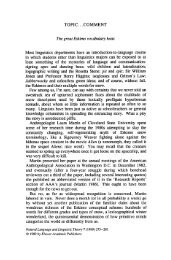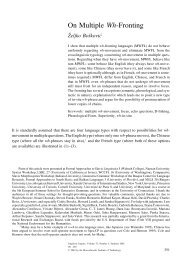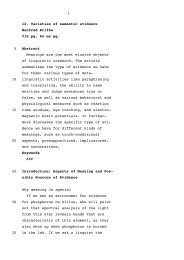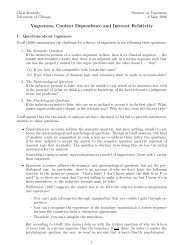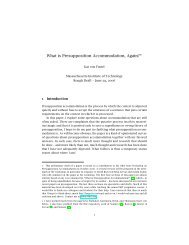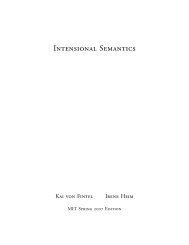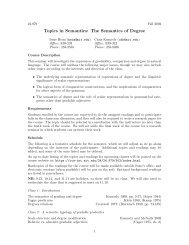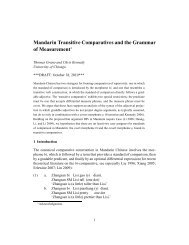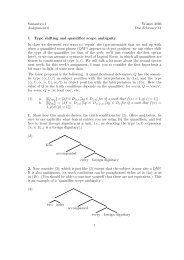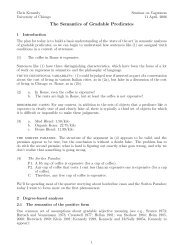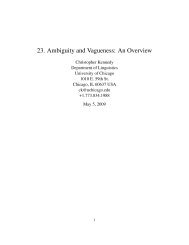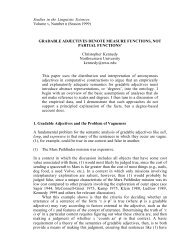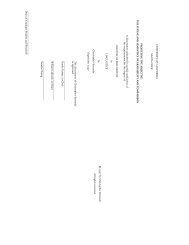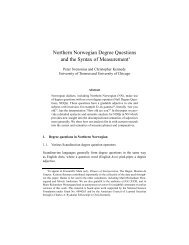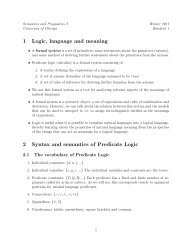On the natural history of negative polarity items - Syntax, Semantics ...
On the natural history of negative polarity items - Syntax, Semantics ...
On the natural history of negative polarity items - Syntax, Semantics ...
You also want an ePaper? Increase the reach of your titles
YUMPU automatically turns print PDFs into web optimized ePapers that Google loves.
Elizabeth Coppock & David Beaver<br />
Weak Uniqueness: The <strong>On</strong>ly Difference Between Definites and Indefinites<br />
This paper <strong>of</strong>fers a unified analysis <strong>of</strong> predicative and argumental definites and indefinites, designed<br />
to account for: (i) anti-uniqueness effects that exclusive adjectives like only and sole give<br />
rise to with definites, and more broadly, <strong>the</strong> absence <strong>of</strong> an existence implication on <strong>the</strong> predicative<br />
use; (ii) <strong>the</strong> dependency between exclusivity and definiteness shown by <strong>the</strong> ungrammaticality<br />
<strong>of</strong> *an only student. Our proposal is that definite and indefinite articles are fundamentally identity<br />
functions on predicates and give rise to existence implications in argument position through<br />
<strong>the</strong>ir association with a discourse referent. They differ only in that definites, unlike indefinites,<br />
presuppose a weak form <strong>of</strong> uniqueness that is independent <strong>of</strong> existence.<br />
The following examples illustrate <strong>the</strong> anti-uniqueness effects in question:<br />
(1) a. He is <strong>the</strong> sole/only student. [1 student]<br />
b. He is not <strong>the</strong> sole/only student. [1+ students]<br />
While (1a) means that <strong>the</strong>re is only one student, (1b) can mean that <strong>the</strong>re is strictly more than one<br />
student. (This implication arises only on <strong>the</strong> predicative reading ‘not only he is an student’, as<br />
opposed to <strong>the</strong> equative reading ‘he is <strong>the</strong> same person as <strong>the</strong> only student’.) This anti-uniqueness<br />
implication entails that <strong>the</strong> cardinality <strong>of</strong> <strong>the</strong> predicate only student is zero. In o<strong>the</strong>r words, <strong>the</strong>re<br />
is no existence implication.<br />
This phenomenon is not specific to exclusives; in general, predicative definite descriptions do<br />
not presuppose existence. <strong>On</strong>e is not committed to <strong>the</strong> existence <strong>of</strong> a queen <strong>of</strong> <strong>the</strong> world when<br />
declaring You’re not <strong>the</strong> queen <strong>of</strong> <strong>the</strong> world, nor must one believe that <strong>the</strong> addressee is attached<br />
when asking Is that your boyfriend?<br />
We <strong>the</strong>refore need an analysis <strong>of</strong> definites on which existence is not implied in <strong>the</strong> predicative<br />
use. Ano<strong>the</strong>r desideratum for an analysis <strong>of</strong> predicative definites is that <strong>the</strong>y be treated as predicates<br />
<strong>of</strong> type e, t , as suggested by Strawson (1950), Graff (2001), and Winter (2001). Evidence for this<br />
comes from <strong>the</strong> distribution <strong>of</strong> <strong>the</strong> overt copula in Hebrew and verbs like consider (Doron 1983).<br />
Winter (2001, pp. 153–4) <strong>of</strong>fers a ‘Frege-Strawson’ analysis <strong>of</strong> predicative <strong>the</strong> according to which<br />
it denotes <strong>the</strong> identity function on predicates P , defined only if |P | =1. For <strong>the</strong>ir argumental use,<br />
definites are converted into quantifiers via <strong>the</strong> introduction <strong>of</strong> a choice function. This gets <strong>the</strong> types<br />
right, but it predicts that (1b) is self-contradictory, because in (1b), <strong>the</strong> predicate that <strong>the</strong> combines<br />
with has cardinality 0 ra<strong>the</strong>r than 1; since <strong>the</strong>re are multiple students, <strong>the</strong>re is no only student.<br />
Predicative definites. We propose that definites are initially predicative and presuppose a weak<br />
form <strong>of</strong> uniqueness (weak uniqueness), which is an implication from existence to uniqueness: if<br />
<strong>the</strong>re is an F, <strong>the</strong>n <strong>the</strong>re is only one (cf. Büring to appear; Schwarzschild 1994; Löbner 2000). The<br />
existence component comes into play when a definite description is used in an argument position.<br />
Effectively, we are splitting up <strong>the</strong> existence and uniqueness components <strong>of</strong> <strong>the</strong> meaning <strong>of</strong> <strong>the</strong><br />
definite article, so that uniqueness is contributed by all uses <strong>of</strong> definites, predicative and nonpredicative<br />
alike, but existence is implied only when definites are used in argument positions. The<br />
proposed basic lexical entry for <strong>the</strong> is (2), where W is a contextually given set <strong>of</strong> worlds.<br />
(2) THE = P : UNIQUE W (P ) .P<br />
(3) UNIQUE W = P.⌃w, x, y[w ⌅ W ⌥ P (x)(w) ⌥ x ⇧= y ⇤ ¬P (y)(w)]<br />
The set <strong>of</strong> worlds W with respect to which UNIQUE is evaluated will typically correspond to <strong>the</strong><br />
set <strong>of</strong> open possibilities in <strong>the</strong> current state <strong>of</strong> <strong>the</strong> discourse.<br />
1



